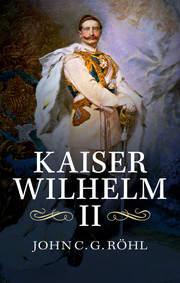Book contents
- Frontmatter
- Dedication
- Contents
- List of figures
- Acknowledgements
- Preface to the English edition
- Preface to the German edition
- Acknowledgements
- Overview: Wilhelm the Last, a German trauma
- Part I 1859–1888: The Tormented Prussian Prince
- Part II 1888–1909: The Anachronistic Autocrat
- Part III 1896–1908: The Egregious Expansionist
- Part IV 1906–1909: The Scandal-Ridden Sovereign
- Part V 1908–1914: The Bellicose Supreme War Lord
- Part VI 1914–1918: The Champion of God’s Germanic Cause
- 25 The Kaiser’s war aims
- 26 The impotence of the Supreme War Lord at war
- 27 Downfall: the collapse of the Hohenzollern monarchy
- Part VII 1918–1941: The Vengeful Exile
- Notes
- Index
27 - Downfall: the collapse of the Hohenzollern monarchy
Published online by Cambridge University Press: 05 September 2014
- Frontmatter
- Dedication
- Contents
- List of figures
- Acknowledgements
- Preface to the English edition
- Preface to the German edition
- Acknowledgements
- Overview: Wilhelm the Last, a German trauma
- Part I 1859–1888: The Tormented Prussian Prince
- Part II 1888–1909: The Anachronistic Autocrat
- Part III 1896–1908: The Egregious Expansionist
- Part IV 1906–1909: The Scandal-Ridden Sovereign
- Part V 1908–1914: The Bellicose Supreme War Lord
- Part VI 1914–1918: The Champion of God’s Germanic Cause
- 25 The Kaiser’s war aims
- 26 The impotence of the Supreme War Lord at war
- 27 Downfall: the collapse of the Hohenzollern monarchy
- Part VII 1918–1941: The Vengeful Exile
- Notes
- Index
Summary
It is not without irony that the more bizarre his fantasies of world domination became, the more Wilhelm shrank into a helpless shadowy monarch in his own realm. A fundamental reform of the Prussian/German constitution, with its antiquated three-class franchise, the Crown’s freedom to choose the Chancellor and the ministers at will and the Supreme War Lord’s unrestricted power to command in military matters, had become imperative through the relentless dictates of total war. Yet Wilhelm II doggedly opposed Bethmann Hollweg’s proposals for reform. The introduction of the parliamentary system would restrict the monarch’s right to select and dismiss his ministers as he pleased, and, furthermore, to accept socialists or Catholic Centre Party members as ministers was simply ‘unthinkable’, he declared in June 1917. The introduction of universal suffrage in Prussia could not be conceded until after the war, he insisted. Despite the threat to his personal monarchy represented by the takeover of power by Hindenburg and Ludendorff in 1916, Wilhelm preferred to take refuge in the shadow of the two generals rather than in the opening offered by a move towards parliamentary responsibility. ‘You know, I’m in seventh heaven with these two men,’ he remarked to one of his Flügeladjutanten.
Relentlessly, both Kaiser and Chancellor became trapped between the grindstones of the increasingly self-confident Reichstag on the one hand and the military dictatorship of the Supreme Army Command on the other. On 12 July 1917 Wilhelm was warned to expect the resignations of Hindenburg and Ludendorff, as they could no longer work with Bethmann Hollweg. The Kaiser was outraged at this insubordination but had to recognise that it would be impossible to allow the two popular army commanders to go. The next day he accepted Bethmann Hollweg’s resignation.
- Type
- Chapter
- Information
- Kaiser Wilhelm IIA Concise Life, pp. 174 - 178Publisher: Cambridge University PressPrint publication year: 2014

